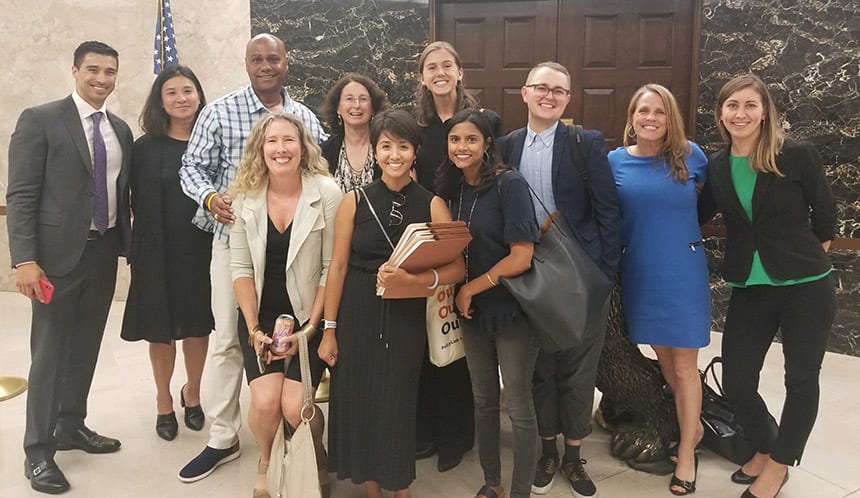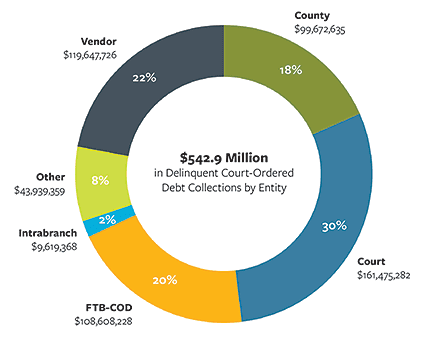
By Sarah Weld
Two Berkeley Law clinics played key roles in persuading California to stop intercepting tax refunds, garnishing wages, and levying bank accounts to pay fees owed to state and local governments during the COVID-19 pandemic. State Controller Betty Yee suspended the debt collection on March 27 and the policy went into effect immediately, making California the first state to take such a step.
“Halting all this collection for everyone in California who has this kind of debt is huge. When we started working years ago on abolishing juvenile fees, I never saw this coming,” says Stephanie Campos-Bui ’14, supervising attorney for the Policy Advocacy Clinic, which works to end fees charged to youth and adults in the criminal system. “COVID has opened up policymakers’ hearts to the everyday struggles people are going through and expanded our imaginations for what changes are possible.”
“It is incredible and unprecedented, and a profound act of both racial justice and pure kindness that the Franchise Tax Board did what it did,” agrees Asher Waite-Jones ’16, supervising attorney in the East Bay Community Law Center’s Clean Slate Clinic, which works to keep people out of the criminal system and help people with criminal records reenter society.
Both clinics are part of Debt Free Justice California, a multiregional coalition focused on ending the ways the criminal legal system drains money from vulnerable communities. Coalition members acted quickly as they saw the arrival of COVID-19 begin to devastate communities—particularly Black, Brown, and low-income families—causing widespread layoffs and loss of healthcare and housing.
“This policy victory would have never happened without the Policy Advocacy Clinic. When impacted community members dedicate their lives to undoing the injustices they have experienced, they deserve the best teammates to support them in achieving big goals, not half-a-loaf solutions,” says Jessica Bartholow, policy advocate for the Western Center on Law & Poverty and a clinic client. “The clinic shows up to be that partner every time and the Franchise Tax Board action was a perfect example of how magical the combination of deep partnership and strategic preparation can be.”

When the Franchise Tax Board dips into tax refunds, paychecks, and bank accounts, families are often left without enough to pay rent, keep the lights on, feed their children, and get medical care. The debt people owe stems mostly from sources such as criminal and juvenile fees, traffic tickets, and infractions like littering or loitering.
The federal government’s recently passed $2 trillion coronavirus relief bill, called the CARES Act, protects families from having their relief bill payments intercepted for money owed to the federal government. If Yee had not halted debt collection in California, the state could have intercepted families’ CARES Act checks for money owed to the state.
Targeting counties and courts
The next step, says Campos-Bui, is convincing California counties and local courts to stop collecting the debt. Before the COVID-19 crisis, many counties and courts stopped collecting juvenile and criminal fees, including referrals to the Franchise Tax Board. Counties often refer outstanding amounts to the Franchise Tax Board when local collection efforts have been unsuccessful.
The COVID-19 crisis illuminates fractures in the system that have long been unjust, say Debt Free Justice California members. They hope the state will not see these measures as temporary, but as an opportunity to re-envision what a more just California could look like post-crisis.
For example, Waite-Jones has a homeless Oakland client who amassed many traffic tickets over the last 15 years, for infractions as small as having tinted windows and littering. On the same day that the Franchise Tax Board’s policy took effect, the man phoned Waite-Jones to say his entire tax return had already been intercepted.
“What happened to him really highlights why what the Franchise Tax Board did was so necessary. He is devastated and has lost faith,” Waite-Jones says.
Another East Bay client, a single mother to a young disabled man, drives a van retrofitted for his wheelchair. She has received a series of parking tickets over the years, for violations like using an expired handicapped placard (she had a new one but had not switched it out yet). The woman is terrified her van will be towed because of unpaid tickets, leaving her with no way to transport her son, says Waite-Jones, who adds that the center is also pushing for a statewide towing moratorium.
Individuals like these, already suffering under the weight of government debt, are also suffering the most in this COVID-19 pandemic. Low-income people are more likely to work in the service industry and lose their jobs, to work in places like grocery stores or delivery services that may expose them to the virus, and to have no health insurance or paid sick leave.
“Knowing that we were heading toward a recession quickly, we asked ourselves, ‘What can we do that will lighten the load for people?’” Campos-Bui says. “This debt, regardless of what it’s for, is looming over some of California’s most vulnerable people and communities, and this action provides immediate relief to millions of families who need every dollar to stay healthy, housed, and fed.”